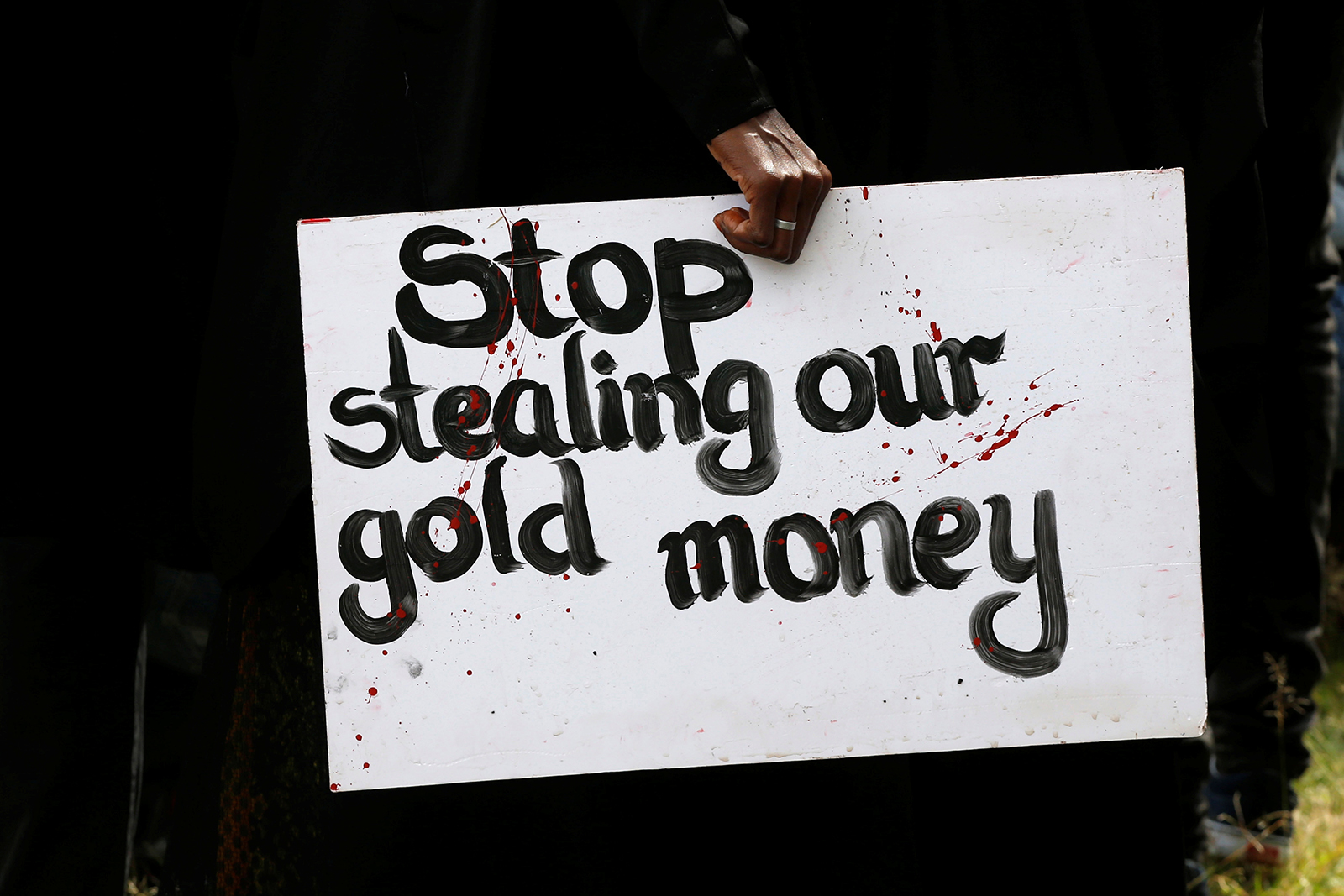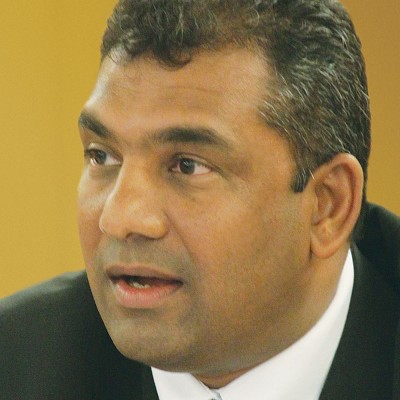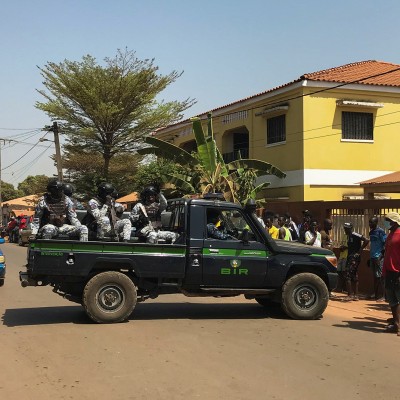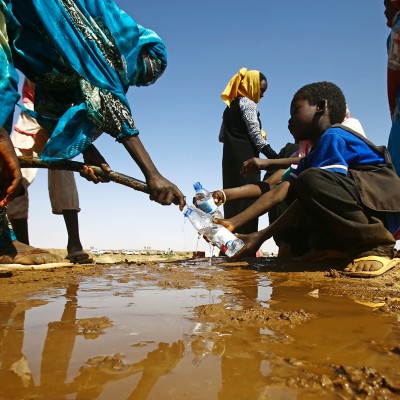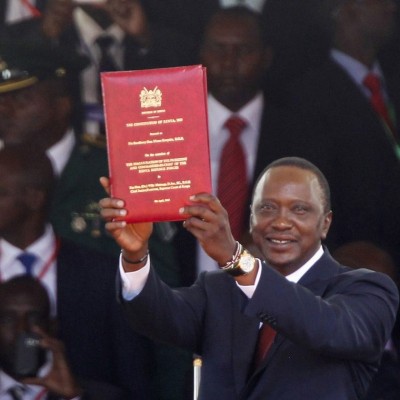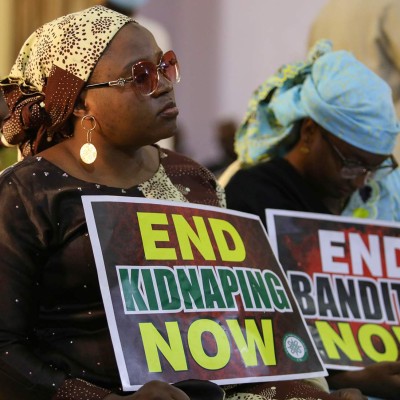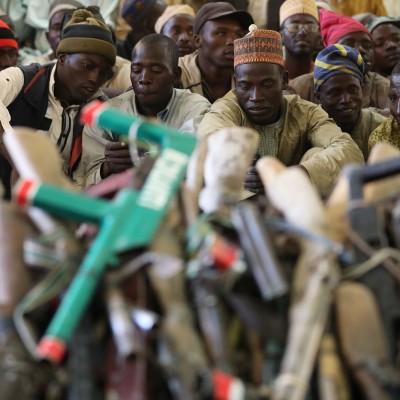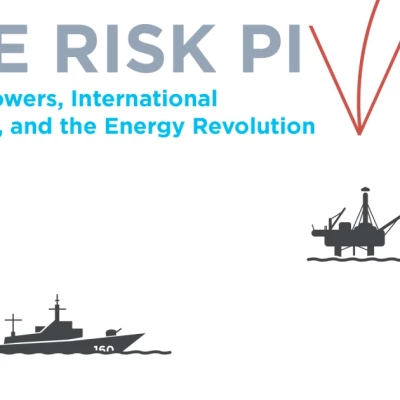Introduction
The term ‘natural resource (in)justice’ has been used in various contexts by various scholars. Contemporary resource justice scholarship highlights several different areas of debate, including power and inequality in resource access, control, ownership, greening, eco-efficiency, feminist ecology, resource transparency, just transitions,[1] resource equity, resource rights, and fairness with regards to global inequality in North/South natural resource policies.[2] Resource injustice underlines two dynamic and interwoven contexts. First, there is the anthropogenic context, which examines the adverse effects of natural resource extraction on humans, including exclusion, degradation, inequality, and unfair treatment in natural resource allocation. Second, there is the eco-centric context, which explores the adverse effects of natural resource extraction on the ecosystem or the natural environment.
The broader terrain within which natural resource justice is being pursued is rapidly changing. With the rise of natural resource justice movements, new ecological threats, the ongoing Covid-19 pandemic, and lethal feedback with deleterious capitalist resource extraction in the global South, resource justice is confronted with new challenges, notably resource conflict.
Since the end of the Cold War, there has been a considerable and increasing number of studies on natural resource conflict, including on questions of resource appropriation or what has become known in resource conflict debates as the ‘resource curse’, which points out the paradox of poverty among resource-rich countries.[3] Conflict and poverty are intertwined. In 2013, 471 million people lived in fragile and conflict-affected countries, while 78% of the world’s poor lived in these countries (181 million people).[4] Natural resources – land, water, forests, air – are essential to life on Earth.[5] Natural resource conflict accounts for the incompatibility of goals in natural resource use or appropriation. The rural poor in developing countries remain the most vulnerable, as they directly depend on natural resources for their food and livelihood security, while the livelihoods of 2.5 billion people depend wholly or partly on agriculture.[6] The dynamics of fair and equitable resource allocation in contexts associated with resource injustice are largely unknown. This is true especially where the resource-bearing local population is either marginalised or excluded in decision-making processes regarding natural resources.
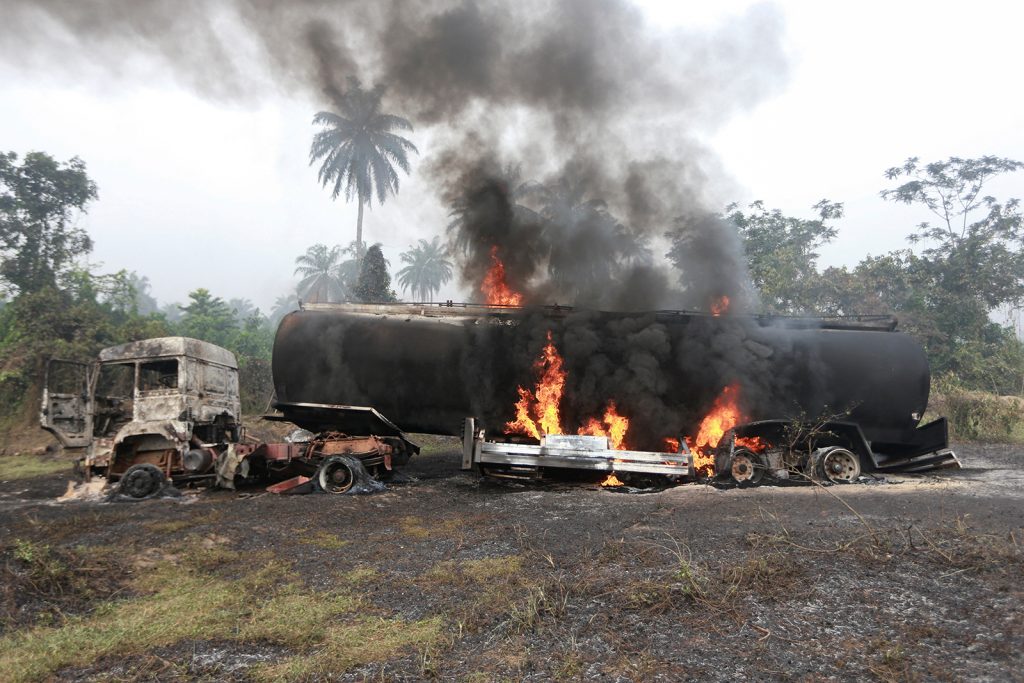
The ascendancy of resource transparency in global discourses following the Extractive Industries Transparency Initiative (EITI) led to the emergence of natural resource-focused concepts, such as resource accounting and transparency. Unlike resource-specific forms of injustice, these concepts tend to cut across various sectors in understanding the drivers of resource appropriation and related asymmetries. In recent years, several scholars have argued, nevertheless, that debates on resource extraction remain overly normative and less transformative.[7]
There are equally divergent perspectives on resource-centric concepts (such as food, forests, water and land). The appropriation of the concept ‘greening’ has accounted for the expansion of capitalist resource exploitation, including land grabbing and broader themes accounting for resource vulnerability.[8] Land grabbing debates demonstrate the extent to which capitalist appropriation of land has undermined the existence and survival of agrarian communities, including food shortages and insecurity.[9]
Yet, the meaning, scope and practical implications of natural resource justice are still contested, reflecting the fact that the causes and effects of resource conflict, as well as efforts to tackle it, continue to raise new concerns with regards to transparency, equity and justice. In natural resource dialogues, there has been increasing attention to issues of resource transparency, inequality and the justice implications of various approaches to resource appropriation, including pollution, degradation, emissions and ecological implications.
Broadly, the wider landscape within which natural resource conflict is situated brings new challenges to the understanding and practice of post-transition peacebuilding. Natural resources abound in Africa (see Figure 1). However, evidence accumulates regarding social, ecological and environmental injustices accounting for conflicts. For instance, oil resource rich countries such as Nigeria, Angola, Chad, Equatorial Guinea, Sudan and South Sudan, and mineral producers such as South Africa, the Democratic Republic of the Congo, Guinea, Mali, Mauritania, Mozambique and Zambia experience varying degrees of resource conflicts. The extent to which fair and equitable practices are adopted in natural resource appropriation remains contestable. There has been a much-needed policy shift to issues of resource conflict as the causes of resource conflict across Africa are diverse. Such conflict scenarios highlight the need to move from resource conflict generally to issues of resource justice in particular, rooted in power and asymmetry in access and control of natural resources.
This article takes stock of existing scholarship and research on diverse understandings of the natural resource justice debate and examines the Niger Delta context. The theoretical framework draws from conflict transformation theory which posits that contemporary conflicts require more than the reframing of positions and the identification of win-win outcomes or identity. Rather the issues of contention could be restructured to meet the demands of conflicting parties and build relationships that extend beyond the particular conflict.[10]
The article examines post-conflict transition challenges in Africa drawing on lessons from post amnesty Niger Delta. It argues that while there is considerable and diverse studies on natural resource conflict and its resolution, including questions of post-conflict peacebuilding, issues of resource justice in post amnesty transition have been in the margins of academic debates, particularly its meaning, scope and practical implications. It demonstrates that natural resource injustice has been a central issue, which accounts for tensions and post conflict crises. It posits that there is a disconnect between academic and policy treatments of the subject of natural resource justice and shows that policies supporting resource justice will provide a stronger integration of equity, social and distributive justice and thus, resolve resource conflicts sustainably. Based on the existing perspectives, the article proposes transformative resource justice, a research agenda centred on resource conflict transformation, placing analysis on justice, equity and fairness as central to resource conflict transformation.
Figure 1: Mapping of Several Key Natural Resources in Africa[11]
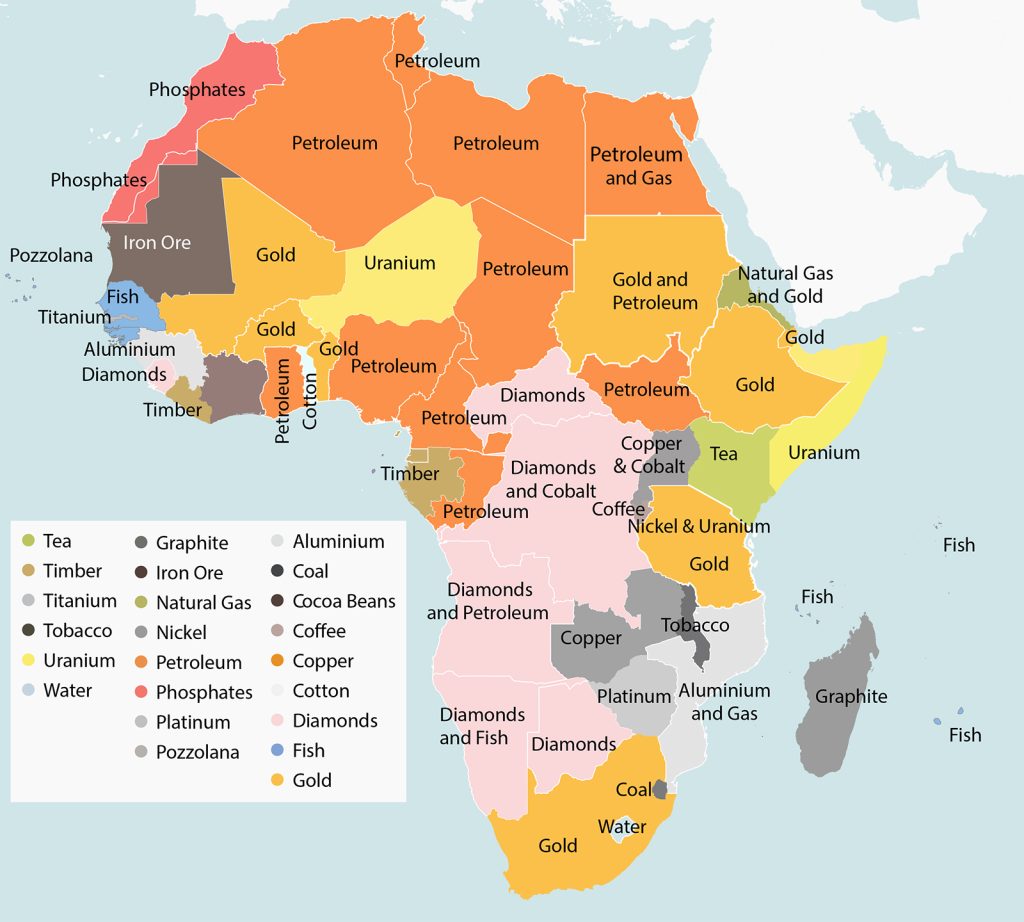
Oil Resource (In)justice in the Niger Delta
It is important to understand the specific context of the Niger Delta in which natural resource injustice occurs and which accounts for protracted resource conflict. Studies on resource conflict in the Niger Delta have rarely linked their arguments to resource injustice, such as oil resource or energy injustice.[12]
The Niger Delta is an oil-rich coastal area in South-South Nigeria, which extends over about 70 000 km2 (27 000 sq. mi) and makes up 7.5% of Nigeria’s landmass.[13] Oil from the region is the main foreign exchange earner for Nigeria. The region has fertile land and rural communities engage in various economic activities, such as fishing and farming. Land and resources are communally owned and traditionally recognised by prior occupation. The community shares access to land rights, rivers, creeks, and agricultural proceeds from these lands and water sources belong to those who use them.
Although in 1956 crude oil was found by Shell in commercial quantities in Oloibiri, a community in Bayelsa State in the Niger Delta, resource justice was not an initial focus in oil extraction by transnational oil companies (TNOCs) operating in the area. This is largely a result of a poor institutional framework that could not hold TNOCs accountable to the oil-bearing communities.
Oil exploitation and exploration in much of the 1970s and 1980s was largely informed by a profit motive, which undermined ecological justice and fair, transparent and equitable practices. Oil extraction became a major source of environmental pollution and a marker of communal violence, as various communities have been in conflict over oil rents.[14] The natural ecosystem became increasingly degraded by land and water pollution. In several Niger Delta communities, such as Nsikak Ogale, Bodo, Ogbe Ijaw, Egbema, and Jones Creek, among others, livelihood vulnerability has been evident due to oil spills in the creeks and farmland.[15]
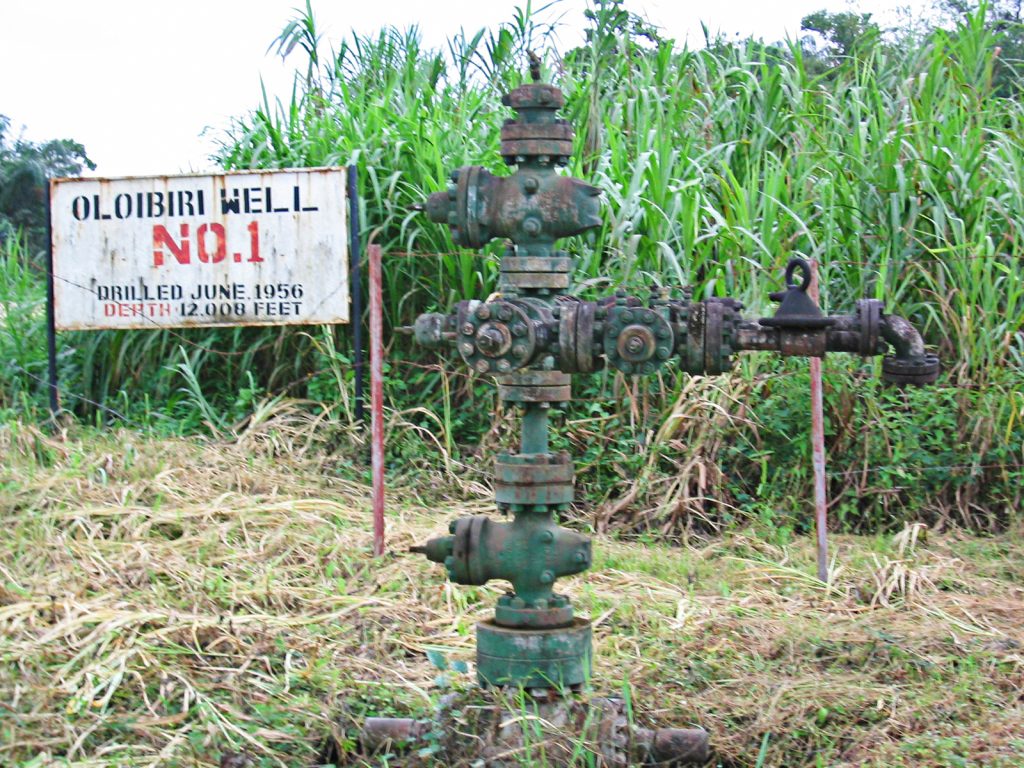
Meanwhile, fish stocks have increasingly declined and forest resources decimated as a result of prospecting for oil by TNOCs. In Eket, Akwa Ibom State, where Mobil is operating, farmland and livelihoods have damaged in some populated areas. The land is unfertile and cannot be used for agricultural cultivation. In Bodo in Rivers State, a United Nations Environment Programme (UNEP) report describes land and water contamination.[16] In January 2021, Ogbeijaw, a community near Warri, was polluted by an oil spill, which covered and destroyed 21 hectares of farmland and food crops.[17]
Aside from land pollution, the water also remains polluted, which should be a source of livelihoods for fishers and the larger community. Presently, several fishing communities experience livelihood vulnerability as their means of subsistence is undermined by water polluted by oil. Most affected is Oyorokoto fishing community in Rivers State. Water samples from the Ogoni communities in Rivers State were found to have low pH levels, making them acidic and capable of solubilising heavy metals.[18] This has serious consequences for human health. Abandoned oil sites in Bodo have long-term damaging impacts on rivers and their surrounding fields because of the build-up of acidic chemicals. Acidic oil pollution affects surface and underground water. This type of pollution continues long after oil sites are closed or abandoned, and the water that leaches into the ecosystem is frequently acidic, poisonous to humans, and kills aquatic creatures.[19] It constitutes a major ecological security threat and serious risk to oil-bearing communities.
The steady rise in the sea level affects most Niger Delta communities, including Nembe and Brass in Bayelsa State. It impacts a wide area and continues to destroy the ecosystem. Most of the affected communities are inundated because of the rising sea level caused by dredging and capitalist oil resource appropriation by TNOCs.
There are several health implications of unjust resource extraction by TNOCs. This includes health hazards associated with water, soil and air pollution. Contamination of water, soil and air contributes to increased toxic build-up in people’s bodies. Gas flaring is a health hazard in parts of the region, including as a result of consequent high temperatures. Vulnerable groups, such as girls, women and the elderly, are most affected. Women are particularly impacted as they are responsible for maintaining family upkeep. In most communities in the region, women are breadwinners and are vulnerable to environmental hazards arising from capitalist oil resource exploitation. As such, women have to carry the burden of ill health arising from environmental destruction and pollution due to oil resource exploitation. They are exposed to toxic fumes from oil spills, acid rain, and heat from gas flaring.
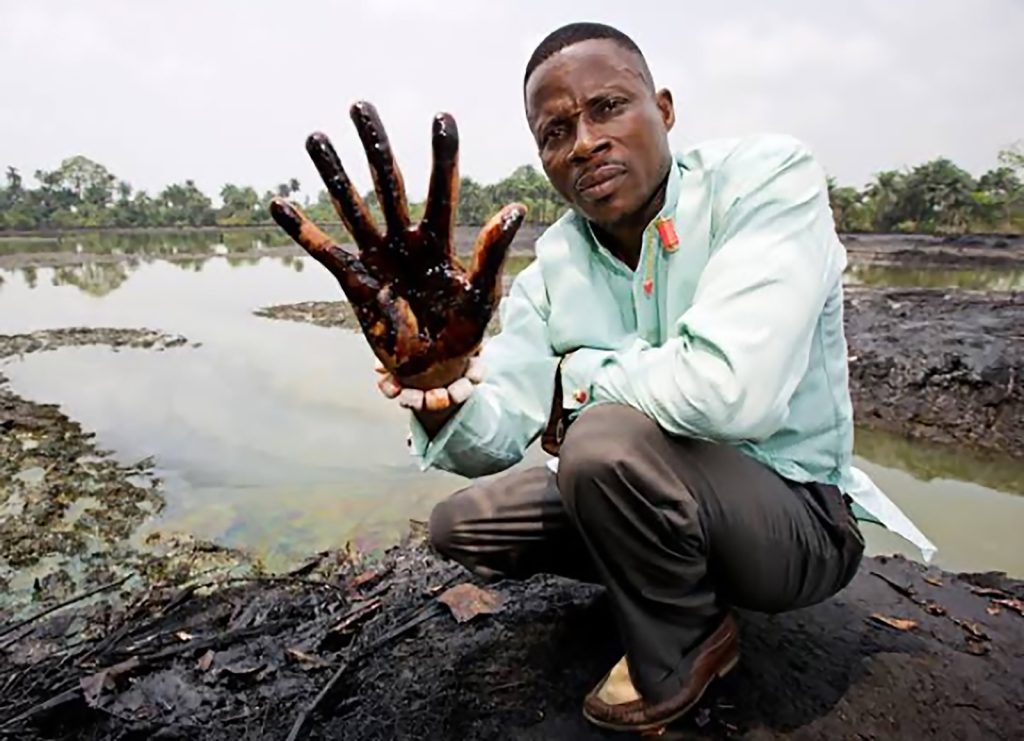
A major consequence of the environmental hazards of oil resource appropriation is livelihood vulnerability. Soil contamination has ruined land that was cultivated by oil-bearing communities, undermining farming livelihoods. Cassava farms along riverbanks have been damaged by dredging. Farmers have lost their crops to land pollution. Fishers have lost their livelihood to oil pollution. Some communities have lost entire livelihoods to oil exploitation. Traditional fishing is no longer possible in polluted rivers.
Capitalist oil resource prospecting, exploration and appropriation, as well as deforestation, oil spills, inundation, and gas flaring, have dislocated the livelihoods of indigenous oil-bearing communities, and displaced them from their ancestral lands. Thus, TNOCs have denied indigenous communities their means of survival, including rights to ownership and control of land and resources.
Loss of biodiversity, flora and fauna due to resource injustice is evident. Not only is the general biodiversity damaged, several plant and animal species are either scarce or extinct. Once-common river birds and tree species have disappeared. Among the bird species rarely seen are the Okwa (indigenous partridge)and several river birds. Similarly, trees such as the Ngala in creeks, which are a habitat for much of the fish stock, have also been lost. There is invasion by an alien plant species, the Nypha palm. Periwinkles are threatened by oil pollution in the creeks. Shrimp, crayfish, Ngolo fish, and eels are in very short supply. The decimation of aquatic animals destabilises the natural ecosystem and undermines the subsistence of the local communities who rely on their natural environment for survival.
Additional impacts of resource injustice are the violation of the collective ecological rights of oil-bearing communities and environmental insecurity is a common feature of oil resource extraction in the region. Communities are displaced from their land and waters, the basis of their subsistence and survival. The experience of the Bodo community affected by massive soil contamination, pollution, and disruption of fishing and agricultural activities remains evident. In 2011, the UNEP reported that it will take 25 to 30 years for an effective clean-up of the Ogoni community polluted by oil from the activities of Shell.[20]
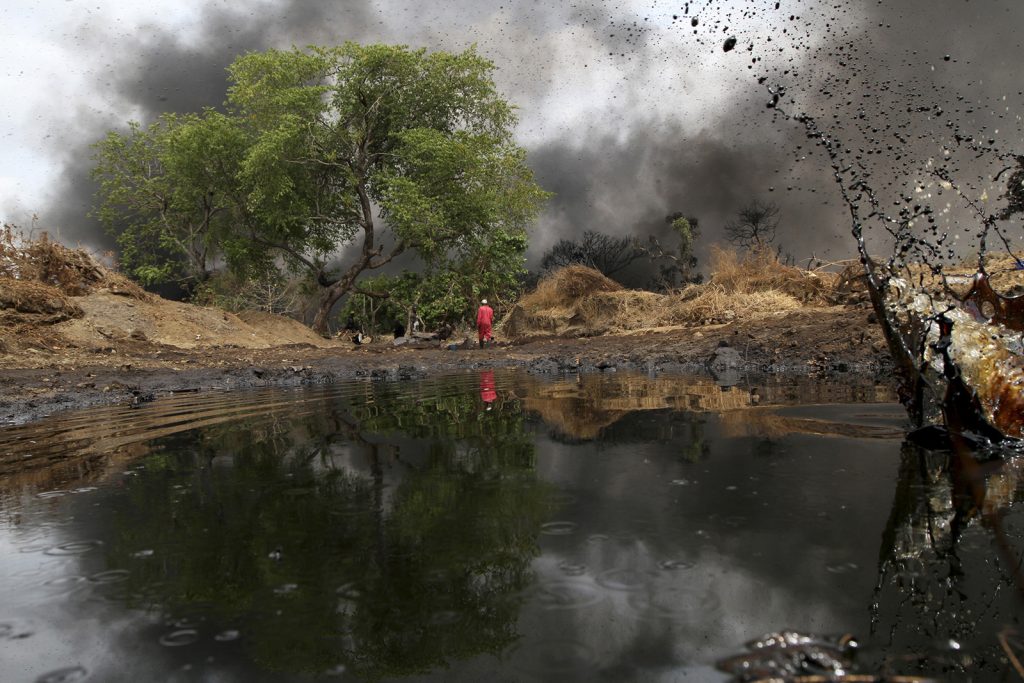
Oil Resource (In)justice and the Rise of Militancy
From the mid to late 2000s, various militia groups started to mobilise around the issue of ‘resource transparency and justice,’ such as the Movement for the Emancipation of the Niger Delta (MEND), Niger Delta Peoples Volunteer Force (NDPVF), Niger Delta Vigilante, and Niger Delta Strike Force (NDSF), among others. The violent agitations and ‘transformative-oriented’ understanding of resource justice draws from the notion of marginalisation and injustice. In the late 2000s, widespread militia resistance accounted for a decline in oil production and export from Nigeria, forcing multinational oil companies to gradually withdraw from exploration, particularly offshore. While some oil companies were shut down, others continued to operate.
Following the rise of militant groups, there emerged violent agitation on rights-based and resource appropriation discourse which drew attention to vulnerable groups most affected by oil resource exploitation and led to wider critique of oil resource politics. Militant groups contributed to shaping resource access, use and the dynamics of control in local contexts and within various resource-bearing communities. Thus, there has been increasing influence on local articulations of resource injustice(s) following violent attacks, disruption of crude oil and gas installations, kidnappings of expatriate oil workers for ransom, and so on. The militants pursued the war within the plains, forests and creeks of the region. Their activities reduced the daily output of crude oil production from 1.2 million barrels per day (bpd) in 2004 to 0.80 million bpd in the first quarter of 2009.[21]
Most resource justice movements and academic debates converge around the issues of:
- Injustice that characterised post-1990 asymmetrical resource extraction, connecting demands for fair and equitable ecological responses to overall lethal outcomes of environmental resource appropriation, such as pollution associated with TNOCs;
- Demands for an equitable resource allocation formula from the federal government to recognise the rights of resource-bearing communities; and
- The rise of resource control and demands for more inclusive and participatory resource appropriation.
The militants’ grievances include neglect by the federal government, loss of control over their resources, marginalisation in the oil economy and within the Nigerian federation, and militarisation and repression through military and security agencies. In relation to the TNOCs, the Niger Delta people protest against environmental pollution, mistreatment, poor compensation practices, poor benefits, unfulfilled promises, failures to implement memoranda of understanding, and inadequate employment and representation.[22] Other issues of agitation are poverty, deprivation, high youth unemployment and hopelessness, the takeover of oil benefits and oil blocks by non-indigenes of the Niger Delta, and the location of TNOCs head offices outside the Niger Delta.
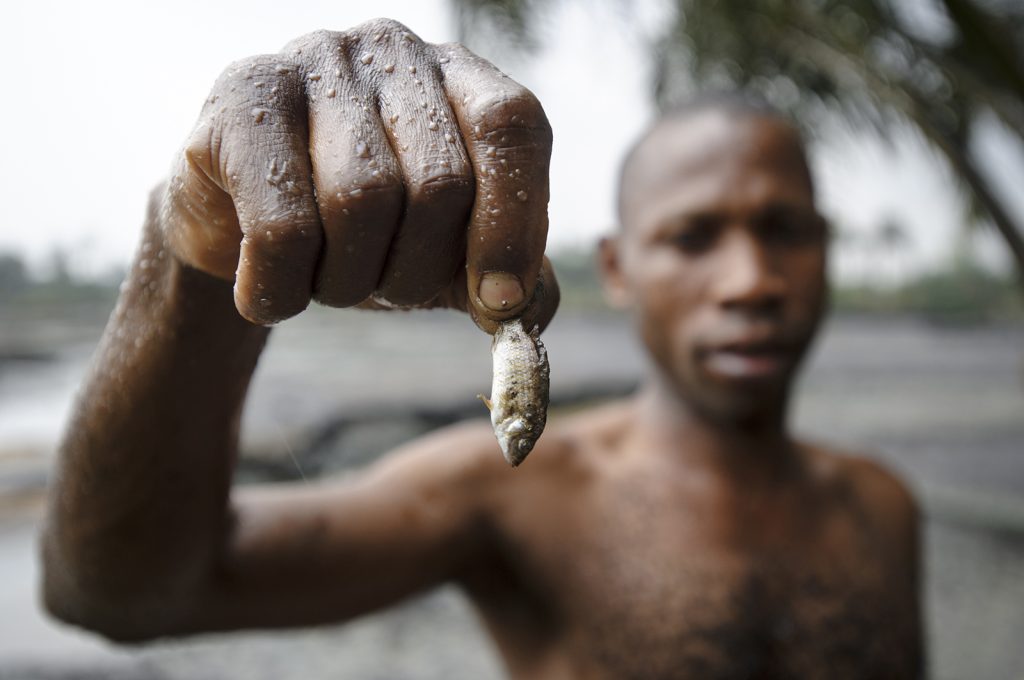
Post-amnesty Conflict and Transition Challenges
The Federal Government of Nigeria introduced an amnesty programme in the Niger Delta in October 2009, also known as the Presidential Amnesty Programme (PAP). This decision was as a result of the ‘doctrine of necessity’ arising from the decline in crude oil production due to the activities of the militants. The objective of the PAP was to place the Niger Delta on the path of conflict resolution, peace-building, stability, and conflict transformation.[23] The PAP has four phases, commencing with pardoning the militants to enable voluntary renunciation of militancy, followed by disarmament, demobilisation, and reintegration (DDR). The phases were designed for the reorientation of ex-militants to facilitate their adjustment to normal life. They were trained in groups in different skills and entrepreneurship in the orientation and rehabilitation camp in Obubra Cross River State.[24]
Disarmament involves the physical removal of the means of combat from ex-belligerents (weapons, ammunition), and sometimes of the civilian population, as well as strengthening responsible arms management[25] to protect a given locality and show the cessation of violence. Demobilisation is the formal and controlled discharge of active combatants from armed groups, and their reorientation through programmes in certain designated locations. Reintegration is the process by which ex-combatants, civilian associates, civil communities, victims of war, and internally displaced persons (IDPs) are reabsorbed into society through training, employment, education, and economic empowerment programmes.[26]
Following the PAP, 30 000 ex-militants were disarmed, demobilised, and reintegrated into society. A considerable number graduated from training programmes.[27] Over 9 192 have graduated from the skills programme in various fields, including welding and fabrication, as well as 66 aeroplane and helicopter pilots, and 61 aviation maintenance engineers.[28]
However, resource equity problems continued in the Niger Delta in the post-amnesty period and the crisis persisted. Agitations against unfair treatment in terms of the engagement of ex-militants in sustainable livelihoods and irregular payment of their monthly stipends as well as confrontations, riots, demonstrations, and youth agitation have occurred. There are pervasive violent conflicts, an arms race, and continued insecurity in the region culminating in the resurgence of post-amnesty militancy.
In 2016, new militant groups emerged, claiming to represent the grievances of local oil-bearing communities. These groups include the Niger Delta Avengers (NDA), Red Scorpions, Niger Delta Greenland Justice Movement (NDGJM), and the Bayan-Men. They renewed attacks on the region’s oil infrastructure, resulting in a reduction in Nigeria’s oil production from 2.2 million bpd to about 1.1 million bpd in 2016.[29]
In November 2021, the Bayan-Men blew up an oil facility operated by the Nigerian Agip Oil Company (NAOC) in Ogba-Egbema-Ndoni Local Government area of Rivers State. The angry militants who destroyed oil well OB5 (Obiavu-5), accused the oil multinational of failing to deal directly with the host communities and they insisted that they were fighting for justice for their people.[30]

Conclusion: Towards Transformative Resource Justice
The article has located resource conflict in post-amnesty contexts with a focus on resource injustice as a major cause of its resurgence. Resource inequality, asymmetry and marginalisation need to be confronted and transformed. Amnesty without justice does not lead to success. What is largely seen as neglect of transformative approaches to resource justice in the Niger Delta is an attribute of the degree of State commitment to distributive and ecological justice, whereby the human ecosystem could be preserved. Natural resource transformation requires political power transformation and a change in the orientation of powerful incumbent actors that benefit from the dominant political economy of capitalist resource asymmetry.
Studies seeking to align amnesty with transformation of the Niger Delta must understand the complex terrain in which exclusionary policies continue to undermine resource justice and transformation of the region. For instance, whether the federal government has implemented the clean-up of the environmentally degraded Ogoni community, as recommended in the 2011 UNEP report, needs to be investigated. It is not enough to grant amnesty. The issue of concern is whether the government has been sincere in resolving the problems that triggered militancy and violent resource conflict. Inclusive and just responses from the federal government would be very valuable in resolving post-amnesty conflict. For example, why has the level of youth unemployment and poverty remained high in such an oil-rich region? Bayan-Men claim that resource injustice is the central cause of their grievance. Post-amnesty conflicts and transition challenges require new policy responses.
Thus, issues of resource transformation through transparency, accountability and ecological justice are imperative. While concerns on issues of justice are often mentioned in policy documents, concerted efforts are required to ensure the implementation of resource justice and resource transparency among vulnerable oil-bearing communities. Despite recent attention to natural resource extraction, transformative resource justice remains a challenge. There is a need to engage with novel and innovative participatory approaches to hear the voices and encourage participation of marginalised oil-bearing communities as dialogue and mediation are key peace-building mechanisms.
Resource justice has a diverse historical trajectory, but it is typically understood either as justice in relation to access or control of natural resources and its impacts, or as justice regarding the effects of natural resource appropriation. Such effects include all forms of environmental degradation and security threats. Some point to the vulnerability component of resource injustice in which oil-bearing communities are exposed to polluted water, degraded land, carbon emissions, acid rain, gas flaring, and all their complex lethal effects. Also, several communities are denied access to natural resources on their lands and thus further marginalised, exploited and disadvantaged by capitalist resource injustice.
Thus, there are several challenges to post-amnesty transition in the Niger Delta. It appears that amnesty cannot be delivered in isolation from the pursuit of resource justice claims, perhaps especially in contexts where the ecological rights of oil-bearing communities must be addressed. There is a need to understand the various concerns of oil-bearing communities which align with resource justice. For example, how has the PAP addressed the reintegration of ex-combatants in terms of empowerment and job creation? What efforts are made to link resource justice with complex ecological vulnerabilities, including environmental degradation, gender justice, water and food justice, resource conflict prevention, and inequitable revenue allocation formula by the federal government, among others?
To build a transformative mechanism requires institutional capacity for peacebuilding. In this context, there is a need to strengthen several institutions, such as, civil society groups, faith-based organisations, and environmental activist groups to build transformative adaptation for sustainable peace. The failure to mitigate gas flaring, acid rain, deforestation, sea level rise, and water and land pollution by TNCs will continue to trigger agitation and resource conflict. To contain capitalist resource extraction-induced degradation requires concerted efforts as resource efficiency, distributive justice, and equity bring with it wide-ranging resource justice challenges among policy-makers and related stakeholders.
Dr Luke Amadi is a Guest Editor at Cambridge Scholars Publishing, UK.
Endnotes
[1] Heffron, Raphael J. and McCauley, Darren (2018) ‘What is the “Just Transition”?’ Geoforum, 88, 74–77.
[2] Roberts, J. Timmon and Parks, Bradley (2006) A Climate of Injustice: Global Inequality, North-South Politics and Climate Policy, Cambridge, MA: MIT Press.
[3] Ross, Michael L. (2015) ‘What Have we Learned about the Resource Curse?’ Annual Review of Political Science, 18, 239–259.
[4] Gerszon Mahler, Daniel; Yonzan, Nishant; Hill, Ruth; Lakner, Christoph; Wu, Haoyu; and Yoshida, Nobuo (2022) ‘Pandemic, Prices, and Poverty’, World Bank Blog, 13 April, Available at: <https://blogs.worldbank.org/opendata/pandemic-prices-and-poverty> [Accessed 3 January 2022].
[5] Sweetman, Caroline and Ezpeleta, Maria (2017) ‘Introduction: Natural Resource Justice,’ Gender & Development, (25)3, 353–366.
[6] Food and Agriculture Organization (FAO) (2016) Statistical Yearbook of the Food and Agriculture Organization, Rome: FAO, Available at: <https://www.fao.org/food-agriculture-statistics/data-release/data-release-detail/en/c/1509352/> [Accessed 3 January 2022].
[7] Igwe, Prince and Amadi, Luke (2022) ‘Natural Resource Conflict and the Real Cause of the Resource Curse in Africa: A Political Economy Approach’, in Chereji, Christian-Radu; Pop, Adrian; and Sandu, Ciprian (eds), Conflict and Climate Change, Cluj-Napoca, Romania: Accent Publishers, pp. 131–150.
[8] Fairhead, James; Leach, Melissa; and Scoones, Ian (2012) ‘Green Grabbing: A New Appropriation of Nature?’ Journal of Peasant Studies, 39(2), 237–261.
[9] Wise, Timothy A. (2021) Eating Tomorrow: Agribusiness, Family Farmers, and the Battle for the Future of Food, New York: The New Press.
[10] Miall, Hugh (2004) ‘Conflict Transformation: A Multi-Dimensional Task’, in Austin, Alex; Fischer, Martina; and Ropers, Norbert (eds), Transforming Ethnopolitical Conflict: The Berghof Handbook, Wiesbaden: VS Verlag für Sozialwissenschaften, pp. 67–89.
[11] Dearden, Nick (2017) ‘Africa is Not Poor, We are Stealing its Wealth’, Al Jazeera, 24 May, Available at: <https://www.aljazeera.com/opinions/2017/5/24/africa-is-not-poor-we-are-stealing-its-wealth> [Accessed 3 January 2022].
[12] Sovacool, Benjamin K. and Dworkin, Michael H. (2014) Global Energy Justice: Problems, Principles and Practices, Cambridge, MA: Cambridge University Press.
[13] Otoabasi, Akpan (2011) The Niger Delta Question and the Peace Plan, Ibadan, Nigeria: Spectrum Books.
[14] Amadi, Luke; Imoh-Ita, Imoh; and Ogbanga, Mina (2016) ‘Exploring Knowledge Management and Green Corporate Strategy (GCS) Nexus’, International Journal of Social Science and Humanities Research, 4(1), 66–82.
[15] UNEP (2011) ‘Environmental Assessment of Ogoniland’, Nairobi, Kenya: UNEP, Available at: <https://postconflict.unep.ch/publications/OEA/01_fwd_es_ch01_UNEP_OEA.pdf> [Accessed 3 January 2022].
[16] Ibid.
[17] Egwu, Patrick (2021) ‘Nigerian Farming Communities Win Landmark Court Ruling Against Shell’, Available at: https://www.ncronline.org/news/earthbeat/nigerian-farming-communities-win-landmark-court-ruling-against-shell [Accessed 7 January 2022].
[18] Ibid.
[19] UNEP (2011), op. cit.
[20] Ibid.
[21] Etepke, Ambily (2012) ‘Review Peace and Development in Nigeria: The Amnesty Experience in the Niger Delta of Nigeria’, Journal of Law and Conflict Resolution, 4(6), 94–102.
[22] Ikelegbe, Austine (2005) ‘The Economy of Conflict in the Oil Rich Niger Delta Region of Nigeria’, Nordic Journal of African Studies, 14(2), 208–234.
[23] Kuku, Kingsley (2013) ‘Nigeria Enlists 30,000 Ex-militants in Presidential Amnesty Programme’, Premium Times, 1 December, Available at: http://www.premiumtimesng.com/news/112493-nigeria enlists-30,000-ex-militants-in [Accessed 4 January 2022].
[24] Vurasi, Serebe S. and Amadi, Okechukwu S. (2020) ‘Beyond Rhetoric: Amnesty Programme and Peace Building in Post Conflict Niger Delta’, Discovery, 56(296), 417–432.
[25] UN Research Institute for Social Development (UNRISD) (2016). Available at: <https://www.unddr.org/modules/IDDRS-4.10-Disarmament.pdf> [Accessed 3 January 2022].
[26] Ikelegbe, Austine (2005) op. cit.
[27] Ibid.
[28] Ebiede, Tarila and Langer, Amin (2017) ‘How Amnesty Efforts in the Niger Delta Triggered New Violence’, The Conversation,8 March, Available at: <https://theconversation.com/how-amnesty-efforts-in-the-niger-delta-triggered-new-violence-74085> [Accessed 5 January 2022].
[29] Ebiede, Tarila (2018) ‘Assessing the Effectiveness of Employment Programmes for Ex Combatants: A Case Study of Nigeria’s Post Amnesty Programme (PAP)’, IDS Bulletin, 49(5), 105–118.
[30] Odiegwu, Mike (2021) ‘Just In: Panic as Militants Blow up Agip Facility in Rivers State’, The Nation, 21 November, Available at: <https://thenationonlineng.net/just-in-panic-as-militants-blow-up-agip-facility-in-rivers> [Accessed 5 January 2022].

